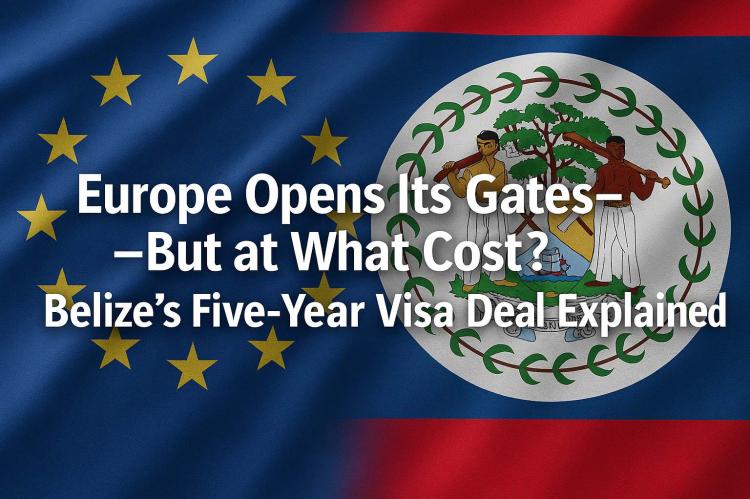📰 Europe Opens Its Gates—But at What Cost? Belize’s Five-Year Visa Deal Explained
By Omar Silva – Editor/Publisher
National Perspective Belize I Digital 2025
Belize City: Thursday 13th November 2025
When news broke that the European Commission had granted Belizeans access to five-year multiple-entry Schengen visas, the Government of Belize celebrated it as a “milestone” and proof of a strong partnership with the European Union. Indeed, it is a diplomatic breakthrough that gives Belizean travelers—businesspeople, students, and families—longer and easier access to 29 European states under the Schengen Agreement.
But as with every handshake across the Atlantic, there are deeper questions: What lies beneath this generosity? Is this a genuine step toward mobility, or a calculated embrace tied to Belize’s biometric data compliance?
What the EU Actually Approved
According to the Ministry of Foreign Affairs, the European Commission has formally communicated its approval of a visa cascade for Belizean nationals who hold biometric passports—regular, official, and diplomatic. This means Belizeans applying through Schengen embassies in Guatemala or Mexico are now eligible for five-year, multiple-entry visas, effective immediately.
In bureaucratic language, this is the most generous application of the EU Visa Code available to nationals of a “third country.” It removes the burden of annual reapplication and acknowledges Belize’s low-risk travel profile and secure biometric passport system.
The Commission’s reasoning, according to the MFA’s statement, is that Belize poses no particular security concern. Hence, Europe has extended what is essentially the highest level of trust that can be granted short of full visa-free travel.
The Legal Backbone – Article 24(2)
This new window is rooted in Article 24(2) of the EU’s Visa Code (Regulation 810/2009):
“A multiple-entry visa valid for a period between six months and five years may be issued to an applicant who proves the need or justifies the intention to travel frequently or regularly, provided that he/she has proved integrity and reliability…”
In practice, the EU uses this article to determine who can skip the tedious one-year renewal cycle. It rewards travelers who have demonstrated lawful conduct, reliable financial means, and genuine ties to their home country.
The Commission can, by decision, extend this privilege to a country en bloc. Belize joins a small list of nations—such as India and Indonesia—that have been granted this accelerated cascade through Implementing Decisions that will soon appear as “C(2025)… documents” on the European Commission’s public Home Affairs site.
A Genuine Step — But a Strategic One
At face value, this decision is genuine. It acknowledges that Belize’s biometric passports meet international security standards and that its citizens present minimal immigration risk. The five-year Schengen visa means fewer fees, less red tape, and a smoother path for Belizeans doing business, studying, or reuniting with family in Europe.
But geopolitically, it is also strategic.
Europe gains a compliant, data-secure partner in Central America—one that has quietly aligned its document standards with EU digital security norms. It’s a reward for modernization, yes, but also a reinforcement of EU influence in a region where digital sovereignty is still fragile.
Belize’s shift to biometric passports and tighter data integration with global systems—while necessary—also means increased dependency on external technological and verification systems. In exchange for easier travel, Belize effectively concedes part of its citizen-data architecture to international scrutiny.
The Missing Piece: The C(2025)… Decision
The actual Commission Implementing Decision—expected to be numbered C(2025)…—has yet to be published on the European Commission’s website. When it appears, it will detail the legal rationale, the consular instructions, and the duration of the arrangement.
Until then, Belize’s announcement stands as the authoritative confirmation, and its entry into effect is immediate.
Yet the absence of the full EU text invites transparency questions: What exactly did Belize agree to behind the scenes? Is this the opening act of a broader visa-liberalization dialogue—or a temporary, data-driven experiment in mobility control?
The Broader Implications
This measure does not grant visa-free travel—something the EU reserves for states on its “Annex II” list. Still, the five-year window places Belize among the most trusted nations still under visa obligations.
Economically, it encourages tourism, trade, and education links with Europe. Politically, it signals alignment: Belize’s institutions have met European security benchmarks and reinforced their compliance with EU-style data standards.
But sovereignty advocates warn of a creeping trade-off. As the EU Entry/Exit System (EES) comes fully online by April 2026, all travelers—including Belizeans—will have their facial and fingerprint data captured at every border crossing. While this does not mean Belize is handing over its internal database, it embeds Belizean travelers into a European biometric surveillance framework that the EU now controls.
Conclusion: An Embrace Worth Watching
For now, the visa cascade is a diplomatic win—real, beneficial, and tangible. But it also reflects how small states like Belize are increasingly drawn into larger data-governance ecosystems, where access is traded for compliance.
Europe has opened its gates—but on its terms.
The onus now lies on Belize to ensure that this newfound mobility does not come at the expense of privacy, autonomy, or future negotiating power.
Sidebar: What Article 24(2) Grants Belizeans
- Multiple-entry visas valid for up to 5 years
- Travel across 29 Schengen states for up to 90 days per 180 days
- Application via Schengen consulates in Guatemala or Mexico
- Applies only to biometric passports—regular, official, and diplomatic
- Subject to EU border biometric registration (EES) by 2026
- Log in to post comments

